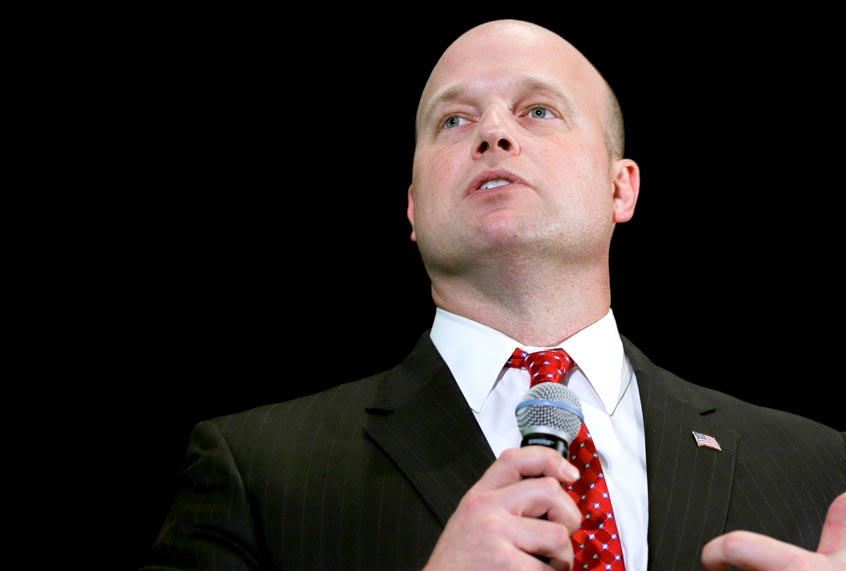The Justice Department released a 20-page memo Wednesday defending the legality of President Donald Trump’s decision to appoint Matthew Whitaker as acting attorney general — rejecting criticism from critics that his selection stands in violation of the U.S. Constitution.
Since his appointment last week, Democrats and conservative legal scholars have argued that it is illegal and unconstitutional for Whitaker, who served as the chief of staff to his predecessor Jeff Sessions, to serve as the nation’s top law enforcement official, because he was not confirmed by the Senate.
Trump responded to the criticism by arguing that Whitaker was “confirmed at the highest level” in 2004 when he was a federal prosecutor in Iowa and by questioning why special counsel Robert Mueller, who is leading the federal investigation into allegations of collusion between the president’s 2016 campaign and the Russian government, was not also confirmed by Congress’ upper chamber.
The memo from the DOJ’s Office of Legal Council (OLC) notes that, before Jeff Sessions was forced out of the Justice Department, the White House had sought advice from Justice Department lawyers about their legal options if the attorney general’s position became vacant.
“This Office had previously advised that the President could designate a senior Department of Justice official, such as Mr. Whitaker, as Acting Attorney General,” the memo reads. “As all three branches of government have long recognized, the president may designate an acting official to perform the duties of a vacant principal office, including a Cabinet office, even when the acting official has not been confirmed by the Senate.”
The memo also notes that Trump has placed non-Senate confirmed candidates in “several lines of agency succession and actually designated unconfirmed officials as acting agency heads,” and that former Presidents Barack Obama and George W. Bush had done the same. It also pointed out that past practice, court rulings and legal analysis show that Whitaker’s appointment does not violate any laws or statutes. In particular, it says the instance is authorized by the 1998 Vacancies Reform Act.
The memo also points out that, even if Trump had fired Sessions — he technically did not, he could have temporarily replaced him with a non-Senate confirmed government official for a period of up to six months. By that reasoning, the president has the power to replace the head of any executive department at will and appoint a first assistant, for example, to serve as the head of a major government agency for half a year or more.
The memo also says that the OLC’s legal analysis of the practice discovered 160 instances in which a non-Senate confirmed officials became the acting head of an agency, although it noted that the majority of those examples occurred prior to 1870. “Mr. Whitaker’s designation is no more constitutionally problematic than countless similar presidential orders dating back over 200 years,” the memo says.
“Few positions are more critical than that of U.S. Attorney General, an office that wields enormous enforcement power and authority over the lives of all Americans,” Maryland Attorney General Brian E. Frosh, a Democrat, said in a statement Tuesday, in which he asked a federal judge to block Whitaker’s appointment and argued that Deputy Attorney General Rod Rosenstein should instead take on the acting role in his place.
Trump appointed Whitaker to serve as acting attorney general last week after Sessions resigned at the president’s request. Critics have expressed concerns about Whitaker’s qualifications and his past statements — most notably his ardent defense of the president on television and in opinion pieces, in which he wrote that any investigation into Trump’s personal finances would constitute “a red line” that Mueller is “dangerously close to crossing.”
The president has denied taking Whitaker’s pulse on the Mueller investigation, but he did not have to. Whitaker has previously written op-eds titled, “Mueller’s investigation of Trump is going to far” for CNN and “I would indict Hillary Clinton: Opposing view” for USA Today. Whitaker, who is a former Fox News contributor, has also defended Trump’s decision to fire FBI Director James Comey in an op-ed titled, “Comey served faithfully, but the president made the right decision.” Whitaker is Trump loyalist — and the president has made it clear that he favors loyalty over nearly all other traits.
Whitaker’s appointment came just one day after the midterm elections, in which Democrats seized control of the House of Representatives and Republicans expanded their slim majority in the Senate, which will smooth the way for Trump to confirm a successor.
With Sessions out, the president must choose a permanent replacement to be the nation’s next top law enforcement official — and there are six people he is reportedly considering for that role. The list includes the former Kansas Secretary of State and right-wing activist Kris Kobach and Chris Christie, the former governor of New Jersey.


